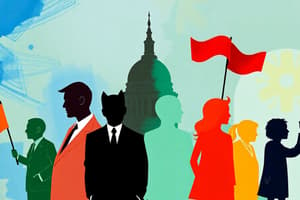Podcast
Questions and Answers
What is the fundamental principle of democracy?
What is the fundamental principle of democracy?
- The government has absolute power
- Power is held by a single ruler
- Elected representatives make decisions without citizen input
- Citizens possess equal rights and opportunities (correct)
What is the primary purpose of free and fair elections in a democracy?
What is the primary purpose of free and fair elections in a democracy?
- To provide a platform for citizens to express their opinions
- To ensure accountability and representation (correct)
- To eliminate minority groups from the political process
- To ensure the ruling party stays in power
Which characteristic of democracy is essential for preventing abuse of power?
Which characteristic of democracy is essential for preventing abuse of power?
- Protection of Individual Rights
- Sovereignty of the People
- Separation of Powers (correct)
- Political Pluralism
What is the primary difference between direct and representative democracy?
What is the primary difference between direct and representative democracy?
Which type of democracy combines elements of direct and representative democracy?
Which type of democracy combines elements of direct and representative democracy?
What is a major challenge to democracy, particularly in terms of political participation and representation?
What is a major challenge to democracy, particularly in terms of political participation and representation?
What is a potential consequence of corruption and abuse of power in a democracy?
What is a potential consequence of corruption and abuse of power in a democracy?
What is a key feature of political pluralism in a democracy?
What is a key feature of political pluralism in a democracy?
What is a common challenge to democracy, particularly in terms of voter engagement?
What is a common challenge to democracy, particularly in terms of voter engagement?
Flashcards are hidden until you start studying
Study Notes
Definition of Democracy
- A system of government where power is held by citizens who possess equal rights and opportunities
- Citizens exercise their power directly or through elected representatives
Key Characteristics of Democracy
- Sovereignty of the People: Power rests with the people, either directly or through elected representatives
- Free and Fair Elections: Regular elections are held to ensure accountability and representation
- Protection of Individual Rights: Guarantee of fundamental rights and freedoms, such as freedom of speech and assembly
- Separation of Powers: Division of power among legislative, executive, and judicial branches to prevent abuse of power
- Political Pluralism: Presence of multiple political parties and diverse viewpoints
Types of Democracy
- Direct Democracy: Citizens directly participate in decision-making processes
- Examples: ancient Athens, modern-day Switzerland
- Representative Democracy: Citizens elect representatives to make decisions on their behalf
- Examples: United States, United Kingdom
- Participatory Democracy: Combines elements of direct and representative democracy
- Examples: community assemblies, citizen juries
Challenges to Democracy
- Voter Apathy: Low voter turnout and lack of political engagement
- Inequality and Discrimination: Systemic barriers to political participation and representation
- Corruption and Abuse of Power: Erosion of democratic institutions and norms
- External Interference: Foreign interference in democratic processes
Definition and Characteristics of Democracy
- Democracy is a system of government where citizens have equal rights and opportunities and exercise power directly or through elected representatives.
Key Characteristics of Democracy
- Sovereignty of the people guarantees that power rests with the people, either directly or through elected representatives.
- Free and fair elections are held regularly to ensure accountability and representation.
- Protection of individual rights guarantees fundamental rights and freedoms, such as freedom of speech and assembly.
- Separation of powers prevents abuse of power by dividing it among legislative, executive, and judicial branches.
- Political pluralism ensures the presence of multiple political parties and diverse viewpoints.
Types of Democracy
Direct Democracy
- Citizens directly participate in decision-making processes.
- Examples include ancient Athens and modern-day Switzerland.
Representative Democracy
- Citizens elect representatives to make decisions on their behalf.
- Examples include the United States and the United Kingdom.
Participatory Democracy
- Combines elements of direct and representative democracy.
- Examples include community assemblies and citizen juries.
Challenges to Democracy
- Voter apathy results from low voter turnout and lack of political engagement.
- Inequality and discrimination create systemic barriers to political participation and representation.
- Corruption and abuse of power erode democratic institutions and norms.
- External interference involves foreign interference in democratic processes.
Studying That Suits You
Use AI to generate personalized quizzes and flashcards to suit your learning preferences.




